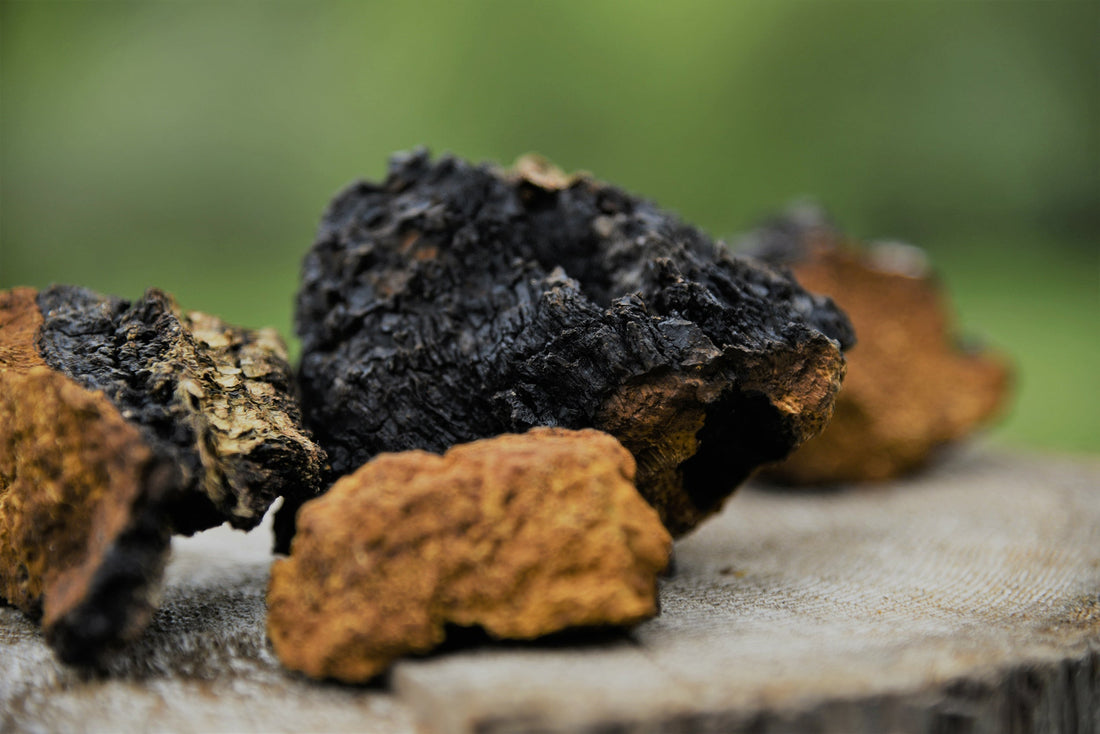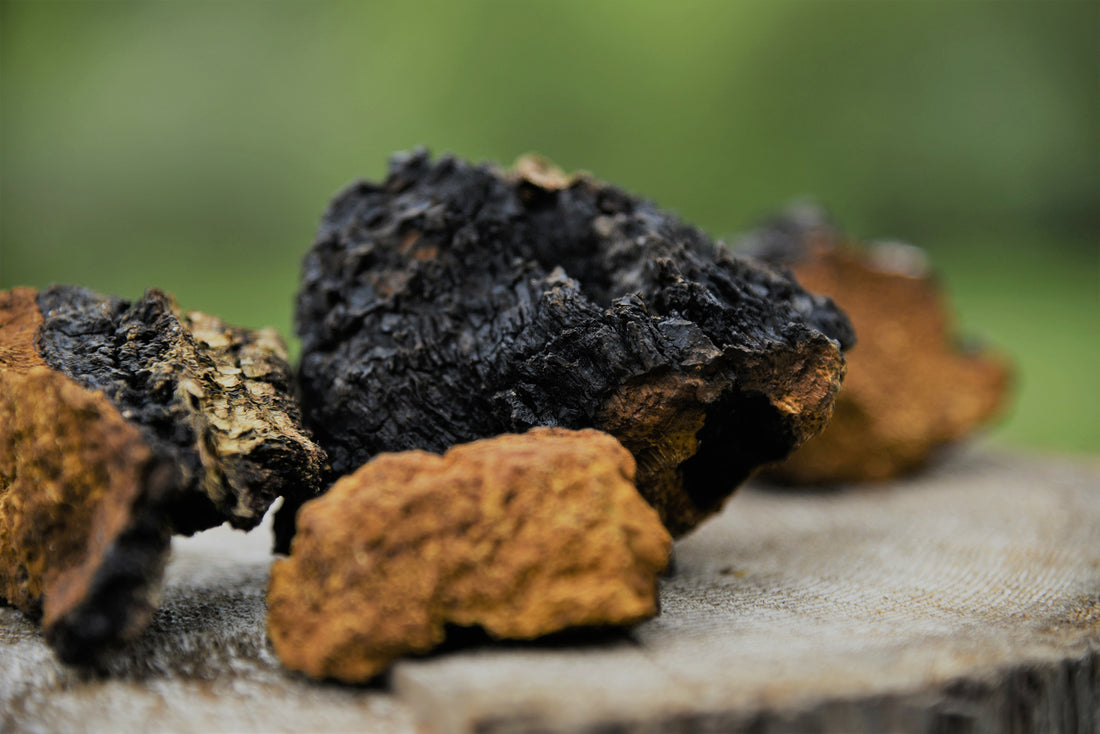 Chaga Mushroom Extract 30%, USDA Organic
Chaga Mushroom Extract 30%, USDA Organic
TMW® Chaga extract is the highest concentration on the market of beta-glucans 1,3 and 1,6.
Chaga is a type of fungus that typically grows on birch trees in cold climates, particularly in the northern regions of Europe, Asia, and North America. It has been used for centuries in traditional folk medicine in these regions. It is often brewed into a tea or used as an ingredient in various health products, including dietary supplements and skincare items. Chaga is believed to be rich in antioxidants, including a variety of beneficial compounds such as polyphenols, triterpenes, and melanin. These compounds are thought to have immune-boosting, anti-inflammatory, and anti-cancer properties.
Benefits
Antioxidant properties: Chaga is known to be rich in antioxidants, which help protect the body against oxidative stress caused by free radicals. Antioxidants can potentially reduce inflammation, support immune function, and help prevent chronic diseases.
Immune system support: Chaga is thought to have immune-enhancing properties. Some studies suggest that Chaga extracts may stimulate certain immune cells, such as natural killer cells and lymphocytes, which play a crucial role in fighting infections and diseases.
Anti-inflammatory effects: Chaga contains anti-inflammatory compounds, such as triterpenes, that may help reduce inflammation in the body. Chronic inflammation has been linked to various health conditions, including heart disease, arthritis, and certain cancers.
Liver health support: Chaga has been traditionally used to support liver health. Some studies have shown that Chaga extracts may have protective effects on the liver and help prevent liver damage caused by toxins and oxidative stress.
Blood sugar regulation: Animal studies have indicated that Chaga may help regulate blood sugar levels and improve insulin sensitivity. However, further research is required to understand its effects on human blood sugar control.
Chaga Mushroom effects on the 12 Hallmarks of Aging:
Telomere Attrition:
Chaga's antioxidants reduce oxidative stress, protecting telomeres from damage and slowing down shortening. Its anti-inflammatory properties also mitigate inflammation-induced telomere shortening. Moreover, Chaga's DNA repair support helps prevent excessive telomere attrition by enhancing DNA repair mechanisms.
Epigenetic Alterations:
Chaga extracts exhibit DNA methyltransferase inhibitory activity, potentially affecting epigenetics through DNA methylation modulation. Chaga's bioactive compounds, like polyphenols, can also influence histone modifications, which may have implications for epigenetic regulation of gene accessibility and expression.
Cellular Senescence:
Chaga’s bioactive compounds have the ability to impact cellular communication by influencing the transmission of signals and signaling pathways between cells. These compounds can also influence the production, release, or activity of intercellular messengers.
Inflammation:
Chaga's bioactive compounds inhibit inflammatory mediators, its antioxidants reduce oxidative stress-induced inflammation, and its immunomodulatory effects promote a balanced immune response.
Dysregulated Autophagy:
Chaga extracts activate the AMPK pathway, promoting autophagy induction and cellular waste clearance. Chaga may also potentially influence the mTOR pathway, affecting autophagy regulation. Its antioxidant effects help maintain autophagic processes and cellular homeostasis by reducing oxidative stress.
Genomic Instability:
Chaga's rich antioxidants reduce oxidative stress, protecting against DNA damage and promoting genomic stability. Additionally, Chaga extracts exhibit DNA repair-enhancing properties, contributing to the maintenance of genomic stability through support of DNA repair mechanisms.
Mitochondrial Dysfunction:
Chaga benefits mitochondrial health and function due to its abundant antioxidants, like polyphenols and melanin, reducing oxidative stress, safeguarding mitochondria from damage and promoting their optimal function. Chaga extracts also enhance energy metabolism and ATP production.
Stem Cell Exhaustion:
Chaga extracts have shown potential in stimulating the proliferation and differentiation of stem cells, particularly mesenchymal stem cells, which may enhance regenerative capacity. Additionally, Chaga's ability to modulate cellular signaling pathways may influence the behavior and function of stem cells, impacting their growth, differentiation, and survival.
Loss of Proteostasis:
Chaga plays a role in autophagy because its bioactive compounds, including polysaccharides, exhibit chaperone activity, aiding in proper protein folding and preventing protein aggregation. Chaga extracts may also induce autophagy, supporting the clearance of damaged or misfolded proteins, and maintaining proteostasis.
Deregulated Nutrient Sensing (metabolic disorders):
Chaga extracts potentially benefit glucose metabolism, improving insulin sensitivity and regulating blood sugar levels. Its antioxidant and anti-inflammatory properties may also help prevent metabolic disorders like diabetes by reducing oxidative damage and inflammation.
Altered Intercellular communication:
Chaga’s bioactive compounds have the ability to impact cellular communication by influencing the transmission of signals and signaling pathways between cells. These compounds can also influence the production, release, or activity of intercellular messengers.
Microbiome Dysbiosis:
Chaga's polysaccharides act as prebiotics, supporting the growth of beneficial gut bacteria and potentially restoring microbial balance. Studies also indicate that Chaga extracts may positively influence gut microbiota diversity, promoting an increase in beneficial bacteria and reducing harmful bacteria.
Sources:
Immunomodulatory Activity of the Water Extract from Medicinal Mushroom Inonotus obliquus
https://www.ncbi.nlm.nih.gov/pmc/articles/PMC3774877/
Recent Developments in Inonotus obliquus (Chaga mushroom) Polysaccharides: Isolation, Structural Characteristics, Biological Activities and Application
https://www.ncbi.nlm.nih.gov/pmc/articles/PMC8124789/
Chaga mushroom extract induces autophagy via the AMPK-mTOR signaling pathway in breast cancer cells
https://pubmed.ncbi.nlm.nih.gov/33798660/
A Critical Review on Health Promoting Benefits of Edible Mushrooms through Gut Microbiota
https://www.ncbi.nlm.nih.gov/pmc/articles/PMC5618583/
Chaga mushroom extract inhibits oxidative DNA damage in human lymphocytes as assessed by comet assay
https://pubmed.ncbi.nlm.nih.gov/15630179/
Interference of Chaga mushroom terpenoids with the attachment of SARS-CoV-2; in silico perspective
https://www.ncbi.nlm.nih.gov/pmc/articles/PMC8988443/
Continuous intake of the Chaga mushroom (Inonotus obliquus) aqueous extract suppresses cancer progression and maintains body temperature in mice
